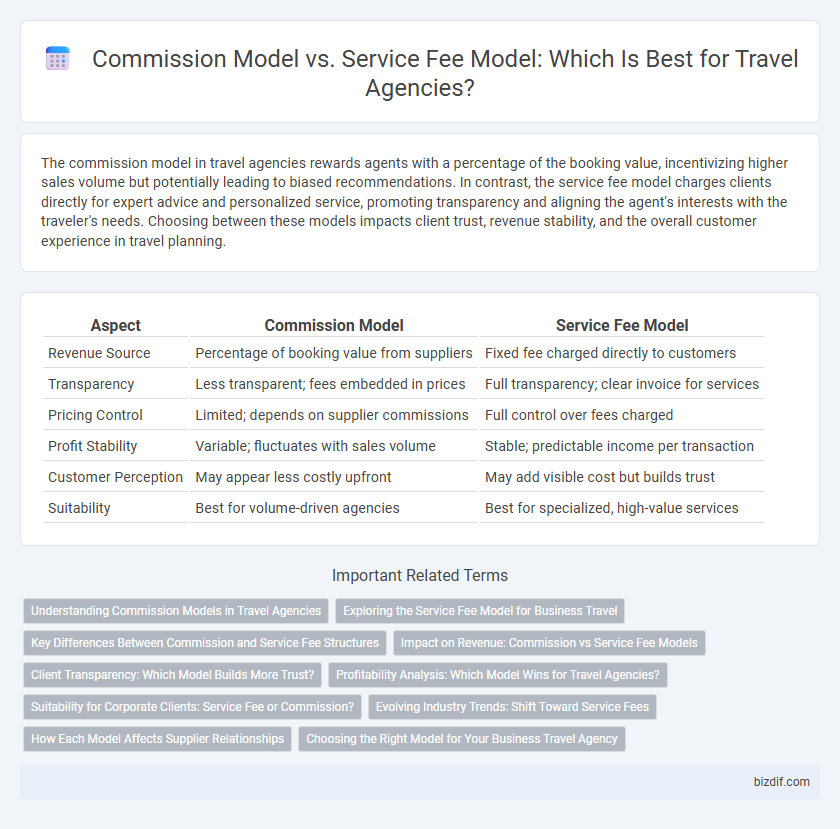The commission model in travel agencies rewards agents with a percentage of the booking value, incentivizing higher sales volume but potentially leading to biased recommendations. In contrast, the service fee model charges clients directly for expert advice and personalized service, promoting transparency and aligning the agent's interests with the traveler's needs. Choosing between these models impacts client trust, revenue stability, and the overall customer experience in travel planning.
Table of Comparison
| Aspect | Commission Model | Service Fee Model |
|---|---|---|
| Revenue Source | Percentage of booking value from suppliers | Fixed fee charged directly to customers |
| Transparency | Less transparent; fees embedded in prices | Full transparency; clear invoice for services |
| Pricing Control | Limited; depends on supplier commissions | Full control over fees charged |
| Profit Stability | Variable; fluctuates with sales volume | Stable; predictable income per transaction |
| Customer Perception | May appear less costly upfront | May add visible cost but builds trust |
| Suitability | Best for volume-driven agencies | Best for specialized, high-value services |
Understanding Commission Models in Travel Agencies
Commission models in travel agencies involve earning a percentage of the total booking value from suppliers such as airlines, hotels, and tour operators, incentivizing agents to promote higher-value or preferred services. This model aligns the agency's revenue directly with sales volume and supplier partnerships, creating opportunities for exclusive deals and negotiated rates. Understanding commission structures helps travel agencies optimize profit margins while maintaining competitive pricing for clients.
Exploring the Service Fee Model for Business Travel
The service fee model in business travel offers transparent pricing by charging clients directly for services rendered, eliminating hidden commissions and fostering trust. This approach enables travel agencies to tailor support and personalized solutions while maintaining consistent revenue streams independent of supplier incentives. Service fees also encourage agencies to prioritize client needs and deliver unbiased recommendations, enhancing overall satisfaction and long-term partnerships.
Key Differences Between Commission and Service Fee Structures
Commission models in travel agencies involve earning a percentage of the booking value from suppliers, aligning agent incentives with higher sales volumes and often resulting in no upfront cost for clients. Service fee models charge clients a fixed or hourly fee regardless of the booking amount, providing transparent pricing and reducing dependency on supplier compensation. Key differences include revenue predictability, potential conflicts of interest, and flexibility in pricing strategies that impact both client trust and operational stability.
Impact on Revenue: Commission vs Service Fee Models
The commission model generates revenue by earning a percentage of the total booking value, incentivizing agencies to promote higher-priced packages and increasing overall sales volume. The service fee model provides a fixed income per transaction, offering predictable revenue streams but potentially limiting income growth tied to booking value fluctuations. Travel agencies must balance client pricing sensitivity with revenue optimization when choosing between commission-based and service fee structures.
Client Transparency: Which Model Builds More Trust?
The service fee model enhances client transparency by clearly outlining costs upfront, eliminating hidden commissions often embedded in package prices. This approach fosters greater trust as clients understand exactly what they are paying for and why, unlike the commission model which may obscure true pricing due to reliance on third-party supplier payments. Clear transparency in pricing directly correlates with increased client confidence and loyalty in travel service interactions.
Profitability Analysis: Which Model Wins for Travel Agencies?
Commission model offers travel agencies a predictable revenue stream based on sales volume, often yielding higher profitability during peak seasons due to supplier partnerships and negotiated rates. Service fee model enables agencies to charge transparent, fixed fees directly from clients, enhancing profit margins by reducing reliance on external commissions and fostering trust with personalized service. Profitability analysis typically favors the commission model for high-volume agents, while boutique agencies benefit more from the service fee model for sustained, client-focused income.
Suitability for Corporate Clients: Service Fee or Commission?
Corporate clients often prefer the service fee model due to its transparency and predictable costs, allowing better budget management for business travel. Commission models may create conflicts of interest as agencies earn based on booking volume or prices, potentially limiting customized solutions. Service fees align with corporate policies demanding accountability and detailed invoicing, ensuring compliance and greater control over travel expenses.
Evolving Industry Trends: Shift Toward Service Fees
The travel industry is increasingly shifting from traditional commission models, where agents earn a percentage of bookings, to service fee models that charge clients directly for personalized expertise. This evolution reflects changing supplier partnerships and consumer preferences for transparent pricing, enhancing trust and profitability for agencies. Service fees offer a sustainable revenue stream amid fluctuating commission rates, positioning agencies to better adapt to market dynamics and deliver tailored travel experiences.
How Each Model Affects Supplier Relationships
The commission model typically fosters strong supplier relationships by aligning agency earnings with sales volume, encouraging collaboration and prioritized access to exclusive deals. The service fee model creates transparent pricing structures, which can lead to more straightforward negotiations but may reduce incentives for agencies to promote specific suppliers aggressively. Understanding these dynamics helps travel agencies choose the approach that best supports long-term partnerships and customer satisfaction.
Choosing the Right Model for Your Business Travel Agency
Choosing the right commission model or service fee model for your business travel agency depends on client preferences, profit margins, and competitive positioning. Commission models earn revenue through supplier partnerships, often preferred for tour packages and flights, while service fee models provide transparent pricing and straightforward client billing. Evaluate your agency's target market and operational costs to determine which model maximizes profitability and client trust.
Commission model vs Service fee model Infographic

 bizdif.com
bizdif.com